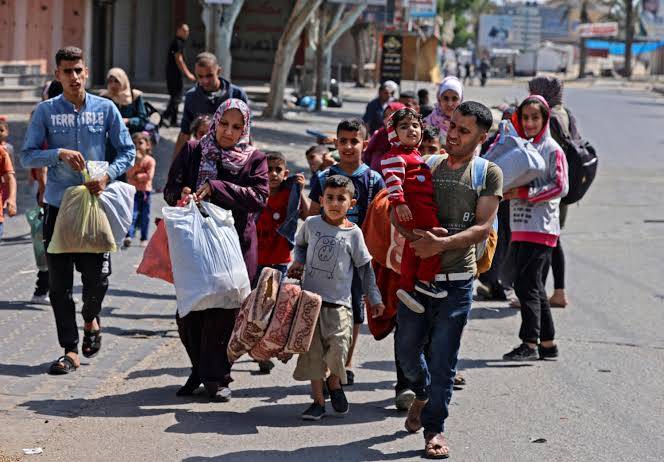Gaza Under Attack: Israel Restricts Palestinians Access To Roughly Two-thirds Of Gaza
The Israeli-Palestinian conflict has taken a devastating turn, with Israel restricting Palestinians' access to roughly two-thirds of Gaza, declaring large areas as no-go zones or issuing forced displacement orders. This move has triggered one of the largest mass displacements of the war, forcing hundreds of thousands of Palestinians to flee yet again.
The latest displacement orders in Rafah and Gaza City have left many Palestinians feeling helpless and exhausted. Abu Hazem Khalef, an elderly man displaced from Gaza City's east, expressed his frustration, saying, "Our biggest struggle now is displacement. We have no idea how to handle this situation." Mahmoud al-Gharabli, another displaced Palestinian, added, "We are being forced to leave and we don't even know where to go. We are exhausted and completely broken."
The situation on the ground is dire, with Israeli forces continuing their devastating aerial attacks. On Friday, at least 30 people were killed since dawn, according to local medical sources and Gaza's civil defense agency. This followed an intense day of bombardment on Thursday that left 112 dead – many of them women and children.
Conditions inside Gaza City's al-Ahli Hospital are nothing short of apocalyptic. Al Jazeera's Hani Mahmoud described the scene, saying, "We are seeing bodies laid on the ground and they are counted in the 10s. We've seen doctors, they are helpless. They don't know what to do. They are unable to save lives given the dire situation inside the hospital."
The conflict has its roots in the rise of Zionism in the late 19th century in Europe, a movement that aimed to establish a Jewish state through the colonization of Palestine. The local Arab population increasingly began to oppose Zionism, primarily out of fear of territorial displacement and dispossession.
The Oslo Accords of 1993 and 1995 were meant to provide a framework for peace, but they ultimately failed to address the core issues of the conflict. The agreements did not uphold Palestinian self-determination or statehood and repealed the internationally accepted interpretation of UN Resolution 242 that land cannot be acquired by war.
Today, the conflict continues to escalate, with Israel's military actions in Gaza drawing widespread condemnation. The international community has called for a ceasefire and a return to negotiations, but a lasting resolution remains elusive.
The humanitarian crisis in Gaza is dire, with hundreds of thousands of Palestinians displaced and struggling to access basic necessities like food, water, and shelter. The UN Office for the Coordination of Humanitarian Affairs (OCHA) has warned of a catastrophic humanitarian situation, with many Palestinians facing severe shortages of food, water, and medical supplies.
The international community has condemned Israel's military actions in Gaza, with many countries calling for a ceasefire and a return to negotiations. The UN Security Council has held emergency meetings to address the crisis, but a unified response remains elusive.
A lasting resolution to the Israeli-Palestinian conflict requires a comprehensive approach that addresses the core issues of the conflict. This includes:
- A Two-State Solution: The establishment of an independent Palestinian state alongside the State of Israel, with borders based on the 1967 lines and a just resolution for Palestinian refugees.
- An End to Settlements: A halt to Israeli settlement expansion in the West Bank and East Jerusalem, which is a major obstacle to peace.
- Security Cooperation: Cooperation between Israel and the Palestinian Authority to address security concerns and prevent violence.
- Economic Development: Investment in the Palestinian economy to promote growth and development.
Conclusion
The Israeli-Palestinian conflict has a long and complex history, with various factors contributing to its escalation. The conflict's roots date back to the rise of Zionism in the late 19th century in Europe, a movement that aimed to establish a Jewish state through the colonization of Palestine. The local Arab population increasingly began to oppose Zionism, primarily out of fear of territorial displacement and dispossession.
The conflict continues to escalate, with Israel's military actions in Gaza drawing widespread condemnation. The international community has called for a ceasefire and a return to negotiations, but a lasting resolution remains elusive.
A lasting resolution to the Israeli-Palestinian conflict requires a comprehensive approach that addresses the core issues of the conflict. This includes the establishment of an independent Palestinian state alongside the State of Israel, with borders based on the 1967 lines and a just resolution for Palestinian refugees. It also requires a halt to Israeli settlement expansion in the West Bank and East Jerusalem, cooperation between Israel and the Palestinian Authority to address security concerns and prevent violence, and investment in the Palestinian economy to promote growth and development.
Ultimately, a lasting resolution to the Israeli-Palestinian conflict requires a commitment to peace, justice, and human rights. It requires a willingness to compromise and to work towards a future that is based on mutual respect and understanding. The international community must continue to play a role in promoting a peaceful resolution to the conflict, and all parties must be willing to work together to achieve a lasting peace.


